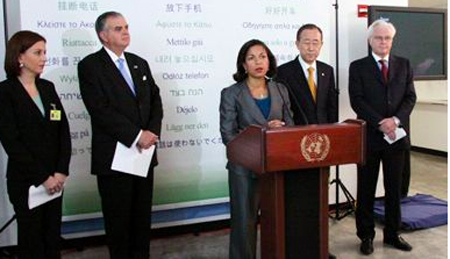Last week, U.S. Ambassador to the UN Susan Rice called a press conference. She used her political capital and soapbox to bring together UN Secretary-General Ban Ki-Moon and Russian Ambassador Vitaly Churkin to combat what she calls "a global problem." She called on world leaders to follow her lead in bringing an end to this global scourge. As the powerful group gathered in front of the international media assembled to witness the announcement, Rice proclaimed, "It's a killer. The suffering it causes is direct and immediate -- lives lost for no reason, futures shattered in an instant. But its toll is truly global. It's a problem, as the Secretary-General just said, that needs global attention and action -- and that's why we all stand here today."

In her first press conference with the Secretary-General and the Russian Ambassador by her side, Rice wasn't speaking about Iran's pursuit of nuclear weapons, Sudan's genocide or North Korea's downing of a South Korean ship. Rice wasn't speaking of the global fight against terrorism either. Rice called the powerful group together to stop the world from texting while driving.
While texting and driving may be an important issue in the United States or other western countries, the overwhelming majority of the world's population doesn't own a cell phone, let alone a car. Recent statistics show that roughly 8% of the world's population owns a car, compared to 89% of U.S. households. Texting while driving, an important public safety issue, is best left to the jurisdiction of local and state officials, not our UN Ambassador. America's representative to the UN has plenty of other issues she should be working on. For Rice to assemble such an important group of leaders to confront such a non-controversial issue shows an incredible weakness as a serious diplomat. Within just a few weeks, Rice chose to speak up on texting while driving but failed to speak out on Iran's election to the Women's Commission.
As Ambassador, Rice hasn't been willing to wade into America's complicated foreign policy challenges and has avoided controversial issues. Citizen Rice, however, talked tough about America's foreign policy challenges and spoke often about Sudan's genocide.
In 2004, citizen Rice lambasted President Bush for not doing more to lead our allies at the UN on the Iranian nuclear issue. She said, "This approach demands more of the United States than abdication to European diplomacy. It requires U.S. leadership, in partnership with the Europeans, of a complex and urgent negotiation with Iran. Apparently, President Bush finds this prospect too difficult or too uncomfortable." (Her full article, "We Need a Real Iran Policy," can be read here: http://www.brookings.edu/opinions/2004/1230iran_rice.aspx). But in the nearly 16 months Rice has been representing the American people at the United Nations, she has not produced a single resolution aimed at stopping Iran from getting a nuclear weapon. The Bush Administration produced five resolutions on Iran's illegal pursuit, three with increasing sanctions.
And in 2007 while working at the Brookings Institute, Rice accepted an invitation from then-Senator Joe Biden to testify before the Senate Foreign Relations Committee on the issue of Darfur. Then citizen Rice said, "The U.S. should press for a Chapter 7 U.N. resolution that issues Sudan an ultimatum. Accept the unconditional deployment of the U.N. force or face military consequences. The resolution would authorize enforcement by U.N. member states collectively or individually." But UN Ambassador Rice hasn't passed, circulated or even written that resolution. And in a 2006 interview with National Public Radio, citizen Rice said, "Well, I think the first thing that the international community ought to do is to strike Sudanese air assets, their aircraft, their helicopters, their airfields, that have been used relentlessly to attack innocent civilians in Darfur." As Ambassador, Rice has never asked the Security Council to approve those airstrikes.
Either Susan Rice is a weak negotiator or she is a tough talker from the sidelines. If America's Ambassador to the UN is to be relegated to stopping drivers from texting while behind the wheel, then maybe President Obama should ask Oprah to be our representative at the UN -- at least she is asking people to sign a contract.